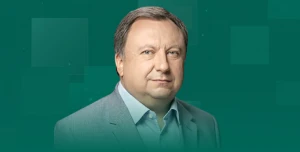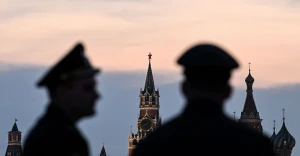
Diplomat on Turkey's actions against Russia: it will take every last drop
Turkey has a number of levers of influence on Russia and will take everything it can from it
Diplomat Ruslan Omelchenko said this on Espreso TV.
"Putin is on Erdogan's hook. Erdogan will twist him to the last drop. Whatever can be taken from Russia, Turkey will take even without signing. The Rome Statute. It will deprive Russia of money, influence, and everything possible. This is a more subtle Eastern policy," he emphasized.
According to the diplomat, Erdogan has made Russia dependent on him by acting as a mediator. Turkey is influential in Syria, where there are Russian groups; Libya; the North Caucasus, Central Asia, where Russia has lost power; and the Black Sea basin, where the Turkish navy dominates.
Ruslan Omelchenko also reminded about transport and economic assistance to the Russian Federation so that it maintains its potential and can fight; Russia's air service with other countries, which will be pressured by the Turkish president, because Moscow depends on Ankara, not vice versa.
Russia's termination of the grain deal
On July 16, the last ship loaded with Ukrainian agricultural products under the initiative left the port of Odesa. On 17 July, Russia announced the termination of the grain deal. In response, Volodymyr Zelenskyy said that it was necessary to continue using the grain corridor even despite Russia's withdrawal from the agreement. And Kuleba began urgent consultations at the UN.
The White House condemned Russia's withdrawal from the grain deal, which played a crucial role in reducing global food prices.
On 18 July, Russian presidential spokesman Dmitry Peskov said there were "certain risks" for parties trying to resume the Black Sea Grain Initiative without Russia's participation.
European Commission President Ursula von der Leyen said that it was critical to restore transport links across the Black Sea to provide food to the world's most vulnerable countries and to preserve the ability to export Ukrainian goods.
On 19 July, it was reported that Ukraine was considering transporting food as part of the grain initiative through the territorial waters of Bulgaria and neighbouring Romania.
At the same time, the Russian Ministry of Defence issued a statement threatening ships heading to Ukraine's Black Sea ports. On the same day, Putin named the conditions for Russia's return to the grain deal and demanded their immediate implementation
The EU's top diplomat, Josep Borrell, said that the only response to Russia's threats to fire on Ukrainian grain ships could be to increase military aid to Ukraine.
Ukraine’s Ministry of Defense announced that starting July 21, all ships heading to the Black Sea in the direction of Russian seaports and Ukrainian ports in the temporarily occupied territory may be treated by Ukraine as military cargo.
On July 21, Recep Tayyip Erdogan said he wanted to discuss the extension of the grain deal with his Russian counterpart Vladimir Putin and expressed confidence that it will work again.
The same day, US Secretary of State Antony Blinken expressed hope that Turkey will help bring Russia back to the Black Sea Grain Initiative, which it disrupted earlier in the week.
On July 22, President of Ukraine Volodymyr Zelenskyy addressed NATO Secretary General Jens Stoltenberg with a proposal to immediately convene the NATO-Ukraine Council due to the security crisis in the Black Sea.
Volodymyr Zelenskyy wrote about his conversation with Stoltenberg on Telegram. It is noted that Zelenskyy and Stoltenberg discussed the implementation of the agreements reached during the Vilnius Summit of the Alliance, as well as further steps towards Ukraine's integration into NATO.
On July 25, the GUR released a report to the Russian leadership, which outlined the technologies used to prevent grain exports from Ukraine, indicating that the "grain deal" was deliberately disrupted.
On the same day, the US State Department, amid the shelling of Odesa and the Danube infrastructure, said that Russia was preparing a false flag operation in the Black Sea on a ship in international waters.
On July 25, Russia laid additional sea mines on the approaches to Ukrainian ports in order to blow up civilian vessels and later blame Ukraine.
On July 26, the UK Ministry of Defense reports that Russia has deployed a modern corvette, the Sergei Kotov, in the southern Black Sea to intercept merchant ships at sea. It patrols the transportation route between the Bosporus and Odesa.
Later, it became known that Russia was preparing aircraft and ships to block the Black Sea, detect and destroy ships.
Russian President Vladimir Putin announces that after unilaterally withdrawing from the Black Sea Grain Initiative, Russia is ready to replace Ukrainian grain and start supplying its own grain to African countries free of charge.
On July 30, during the Sunday Angelus prayer in the Vatican, Pope Francis called on the Russian side to renew the Black Sea Grain Agreement, which allowed Ukraine to safely transport grain. Later, President Volodymyr Zelenskyy said that he considered the Pope's call to Russia important.
On Sunday, July 30, despite the completion of the grain deal, three civilian cargo ships of foreign origin passed the Russian blockade in the Black Sea and anchored in one of Ukraine's grain ports in the Danube Delta.
Southern African countries are trying to convince Russia to return to negotiations on an agreement on the safe export of grain from Black Sea ports, which it abandoned last month.
On August 2, the United States said it had information that Russia was interested in resuming negotiations on the agreement, which ensured safe Black Sea grain exports.
Erdogan also announced an agreement with Putin on a visit to Turkey to discuss the extension of the grain deal.- News














































